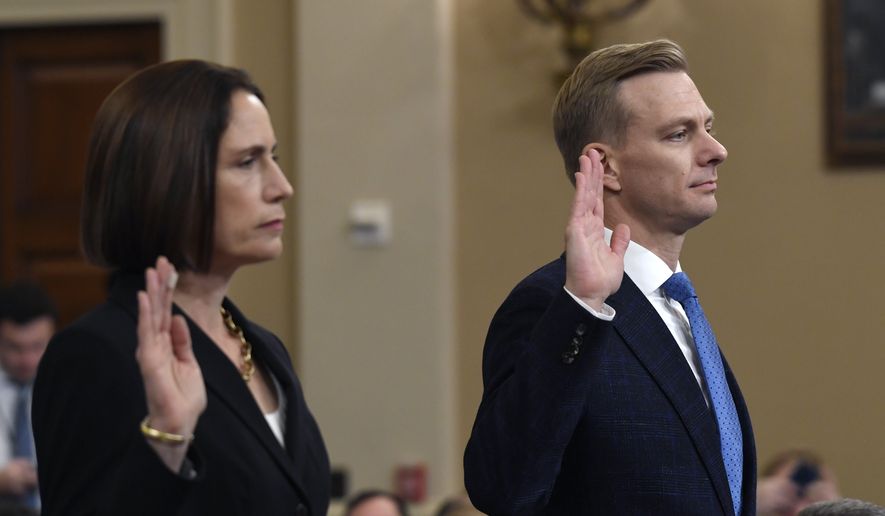Fiona Hill, formerly a top Russia analyst on the National Security Council, plans to slam Republicans on the House impeachment panel for spreading conspiracy theories about Ukraine meddling in the 2016 elections.
Ms. Hill will shoot down the alleged Ukraine meddling, which was one of the investigations President Trump pushed Ukraine to investigate, setting off the impeachment inquiry.
“Based on questions and statements I have heard, some of you on this committee appear to believe that Russia and its security services did not conduct a campaign against our country — and that perhaps, somehow, for some reason, Ukraine did. This is a fictional narrative that has been perpetrated and propagated by the Russian security services themselves,” Ms. Hill said in a prepared opening statement for her testimony Thursday at the House impeachment hearing.
“The unfortunate truth is that Russia was the foreign power that systematically attacked our democratic institutions in 2016,” she said. “This is the public conclusion of our intelligence agencies, confirmed in bipartisan Congressional reports. It is beyond dispute, even if some of the underlying details must remain classified.”
Ms. Hill and State Department aid David Holmes appear Thursday as the final witnesses in the impeachment hearings conducted by the House Permanent Select Committee on Intelligence.
Mr. Trump’s push for Ukraine President Volodymyr Zelensky to investigate election meddling and alleged corruption involving political rival Joseph R. Biden is the basis of the House Democrats’ impeachment case.
SEE ALSO: Gordon Sondland testimony seals Democrats’ impeachment narrative
The impeachment inquiry stems from a July 25 phone call in which Mr. Trump pressed Mr. Zelensky for a “favor” in launching the investigations. A whistleblower, who is believed to be a CIA official assigned to the White House, accused the president of abusing his power for personal gain, including withholding U.S. military aid from Ukraine to force the investigation.
A rough transcript of the call did not show a quid pro quo with the investigation request, but Democrats argue the threat was understood and part of an ongoing pressure campaign of “shadow” foreign policy conducted by Mr. Trump’s private lawyer Rudolph W. Giuliani.
The testimony provided so far has largely centered on people’s opinions about what the president was doing when pressing for an investigation.
In testimony on Wednesday, Gordon Sondland, the U.S. ambassador to the European Union, vouched for a quid pro quo in offering the newly elected Mr. Zelensky a White House visit in exchange for the investigations. But he refused to link the military aid to the requests.
Mr. Trump wanted an investigation into allegations of corruption involving Mr. Biden and his son Hunter, who got a high-paying job on the board of Burisma Holdings, a Ukrainian natural gas company, while his father was the point man for Obama White House policy in the country, which is notorious for corruption, especially in the energy industry.
Mr. Trump also wanted Ukraine to look into election interference and claims that Ukraine has a missing Democratic National Committee server that was hacked by Russia during the 2016 presidential campaigns.
An American cybersecurity company called CrowdStrike examined the server to probe the hack, but the server disappeared before it could be handed over to the FBI.
Mr. Trump subscribes to an unsubstantiated theory that the server ended up in Ukraine.
Democratic leaders had until this week resisted putting the impeachment inquiry to a vote, saying the complaints about the process masked Republicans’ inability to defend Mr. Trump’s action, which they describe as an abuse of his office for personal political gain.
• S.A. Miller can be reached at smiller@washingtontimes.com.




Please read our comment policy before commenting.